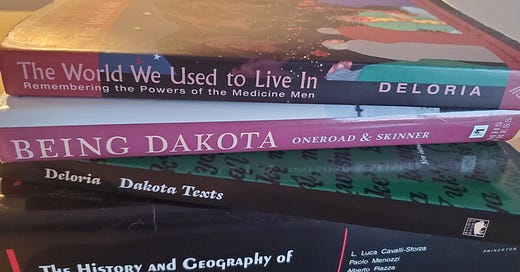This essay was previously published in GeneWatch (Vol. 26, no. 4, August - October 2013). It is now difficult to find online. I’ve linked to the available PDF of the original publication. I first published the essay when I was an Associate Professor of Anthropology at the University of Texas at Austin. This essay answers a misguided question that I am often asked when I speak to non-Indigenous audiences about the politics of science: “Do you believe in science or Indigenous origin stories?”
On April 13, 2005 the Indigenous Peoples’ Council on Biocolonialism (IPCB) issued a press release opposing the Genographic Project, which aimed to sample 100,000 Indigenous and other traditional peoples to “trace the migratory history of the human species” and “map how the Earth was populated.” IPCB critiques Genographic, and the Human Genome Diversity Project before it, as the contemporary continuation of colonial, extractive research. The analysis is also a fundamental historical examination of Western science. IPCB foregrounds the intellectual and institutional authority that science, a powerful tool of colonizing states, has to appropriate Indigenous bodies—both dead and living—material cultural artifacts, and Indigenous cultural narratives in the service of academic knowledge production.
Critics point out that such knowledge rarely serves Indigenous peoples’ interests and can actively harm them. In the 19th and early 20th centuries massacre sites and graves were plundered for body parts to be used in scientific investigations that inform today’s anthropological and biological research on Native Americans. Throughout the 20th century, Indigenous peoples around the world witnessed the too common practice of “helicopter research”—quick sampling without return of results or benefit to subjects. Indigenous DNA samples and data taken in earlier decades when ethics standards were lax continue to be used and cited in contemporary investigations, bringing those injustices into the 21st century. And new, more ethical research still takes time from other pressing projects and needs. Informed community review and collaboration with researchers will increase community benefit, but informed participation has costs. It takes resources to build capacity to sit at the table as equals instead of as vulnerable subjects—as simply the raw materials for science.
Indigenous critics also describe abstract risks that eventually contribute to legal and material harm. They worry about the objectifying nature of human genome diversity research in which Indigenous and other “isolated” peoples are used to represent ancient, less admixed populations—as therefore less evolved and not active parts of the modern world, as vanishing, as less alive. They worry that the explicit racism that plagued the physical and social sciences of earlier centuries, which assumed evolutionary hierarchy among humans, the impending death of the Indian unable to cope with modernity, and a divinely sanctioned Westward expansion, continues to insidiously inhabit modern genomics. And they should be worried. Influential Western narratives about Indigenous cultural stasis and notions of purity still plague the non-genomic sciences, including social and policy sciences and the humanities, with great impact on Indigenous lives. Physical and cultural anthropologists, legal experts, and historians are called upon by the scientific state to adjudicate Indigenous claims to rights or resources, e.g. to determine if a group constitutes an authentic tribe worthy of recognition, or whether American Indian religious freedom is actually being impeded by the actions of loggers, fishers, or rock climbers at a sacred site. In this intellectual climate, it is no wonder that genome science with its considerable cultural influence is viewed as a potential threat.
When Indigenous critics exclaim, "We will not stand by while our ancestors are desecrated in the name of scientific discovery,” or "Our creation stories and languages carry information about our genealogy and ancestors. We don't need genetic testing to tell us where we come from," they are not simply expressing “religious” or “cultural” concerns. To characterize them as simply anti-science, or as religious zealots not only misses their sophisticated historical analyses and political insights, but misunderstands Indigenous creationism as no different from the type of Christian creationism currently challenging the biological sciences and school curriculums.
In the same way that scientific thinkers defend the veracity of the evolutionary narrative (“narrative” does not necessarily mean myth) and scientific education against the “creation science” of some Christians, Indigenous critics call out scientists and the church alike for their missionary tactics and their distortion of Indigenous knowledge. Indigenous critics note that Western cultural and historical standpoints enacted through proselytizing scientific or Christian intellectual traditions get wielded as universal swords of truth over less powerful peoples. Indigenous critics see clearly the ideological biases in both scientific and clerical traditions, which before Darwin’s Origin of Species, were intimately entangled. Today, they are not as disentangled as their respective practitioners would believe. Both science and the church claim the right to tell the only true story of human history. While the empirical data informing the two respective approaches differs, they are both laden with longstanding narratives of Indigenous isolation, unenlightened thought, and deficiency.
But it is very difficult for many non-Indigenous people to see what is so clear to many of us. On the day that IPCB issued its press release calling for a boycott of the Genographic Project, a lively genetic genealogy listerv (genealogists who use genetics to fill in the gaps in their family trees) erupted in defense of Genographic and human genome diversity research. [I write extensively about this list in my book, Native American DNA: Tribal Belonging and the False Promise of Genetic Science.] Populated overwhelmingly by self-identified European-Americans, recent ancestry in Europe is the most popular topic of conversation on this particular list. Native American ancestry is the second most popular. (Unlike the law of hypodescent in which someone with any African Ancestry should be categorized as Black and not white, U.S. race politics have historically sanctioned the absorption of “red” into the white body.) Many of the genetic genealogists on line that day have a deep understanding of genetic science, but could not grasp the basics of IPCB’s incisive political critique. Indigenous critics do not simply object to human genome diversity and migrations research that contradicts Indigenous creation narratives, but condemn the power that science has had to define Indigenous peoples’ histories, identities, and futures. They point out that Indigenous peoples are still subject to exploitation in research. Yet one lister had this to say:
There are some indigenous people who fear anthropological DNA testing for pretty much the same reasons that some people fear genealogical DNA testing. They are comfortable with their myths & not particularly interested in investigating anything that might shake their worldview. Clinging to tradition is not something unique to indigenous people…
Another lister added:
My Mohawk ancestors believed that the world came into being on the back of a turtle. Subsequent evidence from a variety of data sources such as the Hubble Telescope have proven this particular creationist theory to be incorrect. Archaeological and DNA evidence has allowed a robust but incomplete understanding of the correct origins of my ancestors. It is futile to play osterich [sic] and ignore what is staring us in the face. When the evidence speaks loudly one must listen or forever be clinging to false assumptions. Still, that does not in any way affect my deep respect for the traditions of my ancestors, but above all else I want to know the truth…
Native American and Christian perspectives that are critical of genome knowledge are often seen to fall on the same side of a “religion versus science” divide. However, unlike Christianity, Native American origin narratives are generally missing the will to convert and so are without inherent intolerance for other narratives, be they Biblical or evolutionary understandings. In the U.S., Indigenous peoples often say they just want to be left alone to practice their ceremonies without having them outlawed or losing access to sacred sites through land and resource grabs. So why the resistance? Certainly, scientific thinkers do not have to worry about Indigenous people imposing their religions in public school classrooms to the detriment of biology education standards. Even with the balance of cultural power on their side, scientific thinkers are taught to believe that science and politics should be separated for the good of neutral science, that nature and culture are opposed. One cannot be a rigorous scientific thinker and indulge in “politics.” Of course, Indigenous critics call attention to the politics that always already inhabit science. But being allergic to the recognition of power relations in the scientific enterprise no doubt impedes one’s ability to truly grasp Indigenous analyses.
In addition to a politics allergy, scientific thinkers read Indigenous creation narratives in an overly simplistic manner when they reject for example accounts of a people emerging from a cave, or a hole in the ground. They miss central propositions in such narratives that reveal how Indigenous peoples understand the world and their place in it. For example, Indigenous creation narratives provide values for living, narrate our common history, cohere us as Peoples (and not simply “human beings”) with a common moral framework. They tie us to sacred landbases. Indigenous peoples understand ourselves to have emerged as coherent groups and cultures in intimate relationship with particular places, especially living and sacred landscapes.
Indigenous concepts of ancestry and group go far beyond genetic ancestry evidenced in “populations.” They involve biological, cultural, and political groupings constituted in dynamic long-standing relationships with living land- and/or waterscapes that define our people-specific identities. This is an important difference between the way that Indigenous peoples wield the idea of “origins” and the way that human genome diversity does. In the latter case, land- or waterscapes are places through which humans and their molecules move and settle. An environment/human divide is presumed in the genomic narrative that is absent from the Indigenous narrative. Indigenous notions of peoplehood as emerging in relation with particular lands and waters and their nonhuman actors differ from the concept of a genetic population, defined as moving upon or through landscapes. Therefore, it is true that Indigenous creation narratives challenge genomic narratives, but when read in all of their complexity one can see the veracity present in Indigenous creation narratives and the debatable conceptual and material presuppositions of genomic narratives. Indigenous groups are not anti-experimentation or technology, nor reject all new knowledge emerging from sciences, but often want to integrate that knowledge within their world views.
Indigenous peoples do not expect scientists to adopt their stories of origin. Theirs are not generally proselytizing traditions. But they—we—want our political jurisdictions over our bodies and lands upheld and we want the power of our stories to shape our lives respected, and to not be deemed as untruths. The central paradox of 21st century human genome research is that it is presented as global and anti-racist, but has advanced historically by violating subjects’ rights to self-governance, by appropriating their biological resources, and sometimes even their cultural narratives, and by de-valuing the truths and powerful values of those it seeks to include and connect.
Note: I would change some language and terminology if I wrote this piece today. For example, the term “Native American” is now unpleasant to my ears. But the core arguments stand.















Share this post